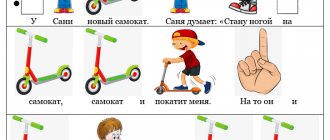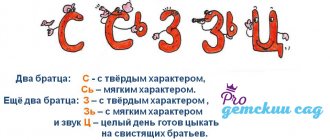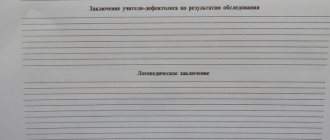Sounds [a], [p], , [t], [d], [f], [v], [m], [n]
| French sound | Similar Russian sound | French letters and letter combinations | Notes |
| vowel | [a] as in the words take , dan , i.e., like [a] under stress before soft consonants | A, a À, à | The ` icon serves to distinguish certain words in writing, for example: a - has (verb form); à is a preposition that conveys the meaning of the Russian dative case (to whom? to what?) and other meanings. The capital letter À is more often represented as A. |
| consonant | [p] as in the word par | P, p | Do not confuse the uppercase and lowercase French letters P, p with the Russian Р, р ! |
| consonant | [b] as in the word b ar | B, b | Do not confuse the capital French letter B with the Russian V ! |
| consonant [t] | [t] as in the word taz | T, t Th, th | |
| consonant [d] | [d] as in the word dar | D, d | |
| consonant [f] | [f] as in the word f act | F, f Ph, ph | |
| consonant [v] | [in] as in the word in al | V, v W, w | The letter W, w is rarely used and is read as [v] in some borrowings from other languages, for example in the word w arrant - guarantee. |
| consonant [m] | [m] as in the word mak | M,m | |
| consonant [n] | [n] as in the word our | N, n |
Please update/change your browser if you experience problems with the audio player below.
Exercise No. 1. Say clearly and energetically:
[ra - ba - ta - da - fa - va - ma - na].
Exercise No. 2. Opposite the letter or letter combination, write the transcription. Test yourself using the table above.
| Sample: | D [d] Th [t] |
| T[] | f [] | t[] | F[] |
| d[] | p[] | à [] | a [] |
| A[] | B[] | b[] | ph[] |
| D[] | Ph[] | n [] | V[] |
| M[] | N [] | Th[] | P[] |
| m[] | v[] | th[] |
Exercise No. 3. Read the sounds from the transcription, not forgetting about their clear and full-voiced pronunciation. Test yourself using the table above.
[n], , [m], [d], , [f], [p], [v], [t].
Phoneme "R"
The phoneme “R” in Parisian pronunciation is the most difficult sound for Russians.
However, Paris is not all of France, and since in the provinces there is a pronunciation of this sound that is close to Russian, Russians can remain with their r with some minor restrictions. As explained above, r refers to a series of vibrating sounds. At the same time, in Russian the tip of the tongue vibrates normally, slightly curved and raised towards the alveoli. The number and strength of vibrations can vary from language to language, and it must be said right away that the French language is generally not characterized by a strongly vibrating r. However, it is not characteristic of Russian either. Russian r normally has one or two vibrations at the beginning of a word (as well as before and after consonants), no more than one between vowels, and only at the end of a word it has up to 3-4 vibrations. Only the latter is not entirely suitable for the French language: there should be no more than two of them in this position. However, something else is much more important: in addition to vibrations, R can be more or less noisy, that is, have some kind of w-shaped sound (and with uvular r, i.e. “R”). Russian r at the end of syllables turns out to be not only multi-stressed, but also quite noisy (which you need to try to hear), and towards the end it is voiceless. All this is certainly unacceptable not only for Parisian r, but also for French in general. In this position, Russians should try to make r more sonant. Everything that has been said remains in full force if instead of the tip of the tongue a small tongue vibrates, i.e. with uvular or velar r, known in everyday life as “burry” (i.e. “r”), which is typical for French. “Barring” does not mean pronouncing the French r correctly. The real Parisian r is pronounced without any vibrations and is a fricative, but a sonant sound, that is, it does not have any friction noise (as we have already observed with “l” and other sonants). It can be articulated either by the back of the tongue or by the edge of the soft palate. In the first case, it is a sonorous but silent x, i.e., the kind of r that is sometimes pronounced in the north in the words rich, good, etc., only completely devoid of friction noises; in the second case, it is a kind of Turkic languages, Armenian, Georgian, Arabic, etc., but also completely silent. This last type of r is produced in the constriction between the back of the tongue and the edge of the soft palate, where the latter is the active organ. The small tongue should be tense, but should not produce any vibrations. In general, neither type seems particularly difficult. It is difficult to learn to use them in all possible combinations and at the same time maintain their musical, “sonant” character, without shortening their duration in the least.
Consonants at the end of words
| At the end of words | ||||
| \ | / | |||
| [d] | — | doesn't turn into | — | [t] |
| [v] | / | \ | [f] |
The rule also applies to all those consonants that you will study further: at the end of words they do not undergo any changes and sound as clearly as before a vowel sound.
Watch yourself: read aloud the Russian words ra b , rad , ro v . What do you hear at the end of words? You hear: [ra p ], [ra t ], [rof ] . Never make such substitutions in your French speech!
Exercise No. 4. Say, clearly contrasting the final sounds:
, [rar - pab], , , .
If a word ends with the sound [v], then any stressed vowel before it is usually lengthened, for example [pa: v ]. The colon in transcription indicates the length of the vowel.
Exercise No. 5. Say, distinguishing between final [f] and [v]:
, , .
Causes of speech impairment
Burr can be caused by a variety of reasons. This can lead to:
- physical or neurological weakness (occurs with chronic diseases);
- parents do not correct the child’s speech when there are mistakes in it or the child pronounces some sounds incorrectly;
- the child hears incorrect speech from adults and copies it;
- phonetic hearing and sound recognition are not sufficiently developed;
- incorrect articulation;
- pathology of the articulatory apparatus.
Burrs can occur after injuries. This is the main reason for the appearance of such a defect in adults. In some cases, correction of burr in adults cannot be carried out without the help of other specialists.
The letter e is at the end of words. French accent. French vowel clarity
The letter e at the end of words is in most cases unreadable, for example: dam e [dam] - lady, arab e [aráb] - Arabic, -aya, -oe.
The stress in French words falls on the last syllable, for example: papa [papá] - dad. It will not be indicated further in the transcription.
All French vowels sound equally distinct and bright both under stress and in unstressed position, for example: panama [p a n a m a ] - Panama. All three [a] are pronounced equally energetically and are not “swallowed” or changed.
Exercise No. 6. Read, not forgetting that the stress in French words always falls on the last syllable:
| banane [banan] - banana | papa [papa] - dad |
| madame [madam] - madam | Nana [nana] - Nana |
| panama [panama] - Panama | (female name) |
Search for mutual understanding.
Do you speak Russian? Parle vu rus? Рarlez-vous russе?
Do you speak English? Parle vu anglais? Charles-vous anglais?
You understand? Comprone wu? Comprenez-vous?
I understand. Same comprand. Je comprends.
I don't understand. Zhe ne compran pa. Je ne comprends ras.
Does anyone here speak English? Es-kyo kelken isi parl anglais? Est-ce que quelqu'un ici parle anglais?
Can you speak slowly? Purje vu parle muen vit? Pourriéz-vous parler moins vité?
Repeat please. Rapete, sil vu ple. Repetez, s'il vous play.
Please write this. Ecrive le, sil vu ple. Ecrivez-le, s'il vous plait.
Double consonants
Double consonants are read as one sound, for example: A nn e [an] - Anna, ba tt e [bat] - sledgehammer.
Exercise No. 7. Read:
| date [dat] — date | patte [pat] - paw |
| datte [dat] - date | panne [pan] - accident |
| nappe [nap] - tablecloth | fade [fad] - insipid, -aya, -oe |
| natte [nat] - braid (braided hair) | bave [ba:v] - saliva |
About the author.
Shevchuk Denis Alexandrovich.
Experience in teaching various disciplines in leading universities in Moscow (economics, law, technology, humanities), two higher educations (economics and law), more than 30 publications (articles and books), Member of the Moscow Union of Lawyers, Member of the Union of Journalists of Russia, Member of the Moscow Union of Journalists , Scholarship holder of the Government of the Russian Federation, experience in banks, commercial and government structures (including in senior positions), Deputy General Director of INTERFINANCE (credit broker, group of companies, www.deniskredit.ru and www.kreditbrokeripoteka.ru).
Graduated from the Moscow State University of Geodesy and Cartography (MIIGAiK), Faculty of Economics and Territory Management (FEUT), Manager (organization management) and Moscow State University. M.V. Lomonosov, French University College (Law), candidate minimum in the specialty “Finance, money circulation and credit”, a number of specialized courses in various fields of knowledge, constantly improves the educational level in various spheres of life, enjoys hatha yoga and various sports.
The author of modern principles of accelerated high-quality learning and memorization of any subjects.
When writing the work, the author received invaluable assistance: Shevchuk Vladimir Aleksandrovich (three higher educations, experience in management work in banks, commercial and government agencies), Shevchuk Nina Mikhailovna (two higher educations, experience in management work in commercial and government structures), Shevchuk Alexander Lvovich ( two higher educations, has great achievements in scientific and practical activities).
The author also took advantage of consultations from employees of leading universities and organizations in Moscow and Zheleznodorozhny, Moscow region. (including the Pavlino microdistrict).
Alternative teaching methods
You can teach your child the correct pronunciation using the example of your favorite cartoon song. You can turn it on every evening and start watching it by singing along to the melody with the words. Music, especially pop artists, can also help adults. A smooth composition with a good French performer is suitable for learning.
You can control the quality of pronunciation using a voice recorder. Recordings should be compared with the speech of native speakers. This could be an audio course on language learning or a text from a YouTube blogger. But you need to be careful, since not all French people pronounce sounds correctly.
Reading texts in French aloud gives good results. These can be classical works or simple press. The content is not so important, because the sound “r” is quite common. It is worth paying attention to pronunciation in different positions.
You can learn poems in French. This is especially convenient to do while listening to the actors read and repeating after them. This will help form the correct pronunciation, as well as correct mistakes. At the initial stage, you should choose people with a light sound, without pressure. As the language improves, you can pay attention to readers with a more powerful graded “r”. It is more difficult to pronounce, but you need to master it in order to speak beautifully and correctly.
If you have established reading skills in French, you can use sayings and tongue twisters with an abundance of “r” for learning. They will help consolidate the skill and bring pronunciation to automaticity. But this exercise should be introduced at the very end, when the articulatory apparatus is ready for the correct sound. Of the most popular phrases, several of the most effective ones can be identified:
- "Mon père est maire, mon frère est masseur."
- "Dans la gendarmerie, quand un gendarme rit, tous les gendarmes rient dans la gendarmerie."
- “Rat vit riz, Rat mit patte à ras, Rat mit patte à riz, Riz cuit patte à rat.”
You need to start pronouncing phrases at a slow pace. It is worth paying special attention to the pronunciation of “r” and the occurrence of vibrations. At the end of a word, up to 2 of them are allowed, but in other parts there should be none at all.
After mastering a slow tempo without making mistakes, you should try to speak faster. This will help you navigate oral speech and not get lost when communicating with the French. This way, the pronunciation of “r” will become automatic and will become easy and imperceptible.
You need to work on sounds at least 2 times a day. Otherwise, the speech apparatus may again adapt to the Russian “r”, and it will have to be configured again. Only when the muscles completely remember their position can you conduct classes 2-3 times a week.
Hotel.
Can I reserve a room? Puige reserve yun chambre? Puis-je reserver une chambre?
Single room. Un chambre pur yung person. Une chambre pour une perssonne.
Chambre individual. Chambre individuale.
Room for two. Un chambre pour de person. Une chambre pour deux personnes.
Chambre double Chambre double.
Not very expensive. Pa tre shar. Ras tres cher.
Bon Marche Bon Marche.
How much does a room cost per night? Combian cut set chambre par nuit? Combien couté cette chambre par nuit?
For one night (for two nights) Pour un e nuit (deux nuits).
I would like a room with a telephone, TV and a bar. Je voudrais une chambre avec un telephone, une television et un bar.
I booked a room in the name of Catherine Jae reserve une chambre au nom de Catherine J'ai reserve une chambre au nom de Catherine.
Please give me the keys to the room. Je voudrais la clef de ma chambre.
Are there any messages for me? Avevu de masaj pur mua? Аvez-vous des messages оur moi?
What time do you have breakfast? And kel yor servevu lepeti dezhene? A quelle heure servez-vous le retit déjeuner?
Hello, receptionist, could you please wake me up at 7 am tomorrow? Ale la reseptsion puve vu me reveye dyoman matan a set(o)or? Hello, la recertion, rouvez-vous me reveiller demain matin a 7 heures?
I'd like to pay you back. Zhe voodre ragle A not. Je voudrais regler la note.
I'll pay in cash. Jeu ve paye en espas. Je vais pauer en esres.
Table with cardinal numbers
| Writing a numeral | Pronunciation | Analogue in Russian |
| zero | ||
| un m.r. une w.r. | one one | |
| deux | 2 | |
| trois | 3 | |
| quatre | 4 | |
| cinq | 5 | |
| six | 6 | |
| sept | 7 | |
| huit | 8 | |
| neuf | 9 | |
| dix | 10 | |
| onze | 11 | |
| douze | 12 | |
| treize | 13 | |
| quatorze | 14 | |
| quinze | 15 | |
| seize | 16 | |
| dix-sept | 17 | |
| dix-huit | 18 | |
| dix-neuf | 19 | |
| vingt | 20 | |
| vingt et un | 21 | |
| vingt-deux | 22 | |
| vingt-trois | 23 | |
| vingt-quatre | 24 | |
| vingt-cinq | 25 | |
| vingt-six | 26 | |
| vingt-sept | 27 | |
| vingt-huit | 28 | |
| vingt-neuf | 29 | |
| trente | 30 | |
| trente et un | 31 | |
| trente-deux | 32 | |
| trente-trois | 33 | |
| trente-quatre | 34 | |
| trente-cinq | 35 | |
| trente-six | 36 | |
| trente-sept | 37 | |
| trente-huit | 38 | |
| trente-neuf | 39 | |
| quarante | 40 | |
| quarante et un | 41 | |
| quarante-deux | 42 | |
| quarante-trois | 43 | |
| quarante-quatre | 44 | |
| quarante-cinq | 45 | |
| quarante-six | 46 | |
| quarante-sept | 47 | |
| quarante-huit | 48 | |
| quarante-neuf | 49 | |
| cinquante | 50 | |
| cinquante et un | 51 | |
| cinquante-deux | 52 | |
| cinquante-trois | 53 | |
| cinquante-quatre | 54 | |
| cinquante-cinq | 55 | |
| cinquante-six | 56 | |
| cinquante-sept | 57 | |
| cinquante-huit | 58 | |
| cinquante-neuf | 59 | |
| soixante | 60 | |
| soixante et un | 61 | |
| soixante-deux | 62 | |
| soixante-trois | 63 | |
| soixante-quatre | 64 | |
| soixante-cinq | 65 | |
| soixante-six | 66 | |
| soixante-sept | 67 | |
| soixante-huit | 68 | |
| soixante-neuf | 69 | |
| soixante-dix | 70 | |
| soixante-onze | 71 | |
| soixante-douze | 72 | |
| soixante-treize | 73 | |
| soixante-quatorze | 74 | |
| soixante-quinze | 75 | |
| soixante-seize | 76 | |
| soixante-dix-sept | 77 | |
| soixante-dix-huit | 78 | |
| soixante-dix-neuf | 79 | |
| quatre-vingts | 80 | |
| quatre-vingt-un | 81 | |
| quatre-vingt-deux | 82 | |
| quatre-vingt-trois | 83 | |
| quatre-vingt-quatre | 84 | |
| quatre-vingt-cinq | 85 | |
| quatre-vingt-six | 86 | |
| quatre-vingt-sept | 87 | |
| quatre-vingt-huit | 88 | |
| quatre-vingt-neuf | 89 | |
| quatre-vingt-dix | 90 | |
| quatre-vingt-onze | 91 | |
| quatre-vingt-douze | 92 | |
| quatre-vingt-treize | 93 | |
| quatre-vingt-quatorze | 94 | |
| quatre-vingt-quinze | 95 | |
| quatre-vingt-seize | 96 | |
| quatre-vingt-dix-sept | 97 | |
| quatre-vingt-dix-huit | 98 | |
| quatre-vingt-dix-neuf | 99 | |
| cent | 100 | |
| cent un | 101 | |
| cent deux | 102 | |
| cent trois | 103 | |
| cent quatre | 104 | |
| cent cinq | 105 | |
| cent douze | 112 | |
| cent vingt-trois | 123 | |
| cent soixante-onze | 171 | |
| deux cents | 200 | |
| deux cent un | 201 | |
| deux cent deux | 202 | |
| deux cent trois | 203 | |
| deux cent seize | 216 | |
| deux cent quarante-cinq | 245 | |
| deux cent quatre-vingt-dix-huit | 298 | |
| trios cents | 300 | |
| quatre cents | 400 | |
| cinq cents | 500 | |
| six cents | 600 | |
| sept cents | 700 | |
| huit cents | 800 | |
| neutral cents | 000 | |
| mille | 1000 | |
| mille un | 1001 | |
| mille deux | 1002 | |
| mille cinquante-six | 1056 | |
| mille huit cent soixante-dix-neuf | 1879 | |
| deux mille trois cent quarante et un | 2341 | |
| un million (n.) | 1.000.000 | |
| trois millions deux cent quarante-trois mille six cent quatre-vingt-neuf | 3243689 | |
| un milliard (n.) | 1.000.000.000 |
If it doesn't work out
When not a single exercise helps you adjust the sound correctly, and it doesn’t work out even with a teacher, you should consult a dentist. He will check the structure of the jaw apparatus and the length of the frenulum. This is a small piece of connective tissue between the tongue and the floor of the mouth.
If the frenulum is short, this may become an obstacle to the correct pronunciation of sounds. In this case, it is lengthened by making an incision. It is performed in a few minutes under local anesthesia, and does not cause discomfort within a couple of hours after the operation. After recovery, you can start exercising again.
Learning foreign languages requires a lot of effort to achieve correct pronunciation. But competent daily practice always bears fruit. The ability to speak and sing in another language opens up great prospects both for creativity and for communicating with representatives of another culture and nationality. And this is important for social development and human formation.










